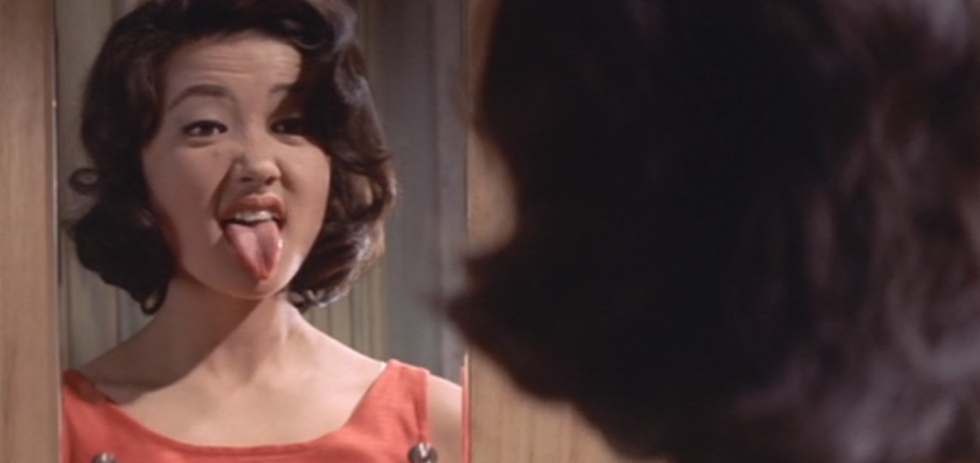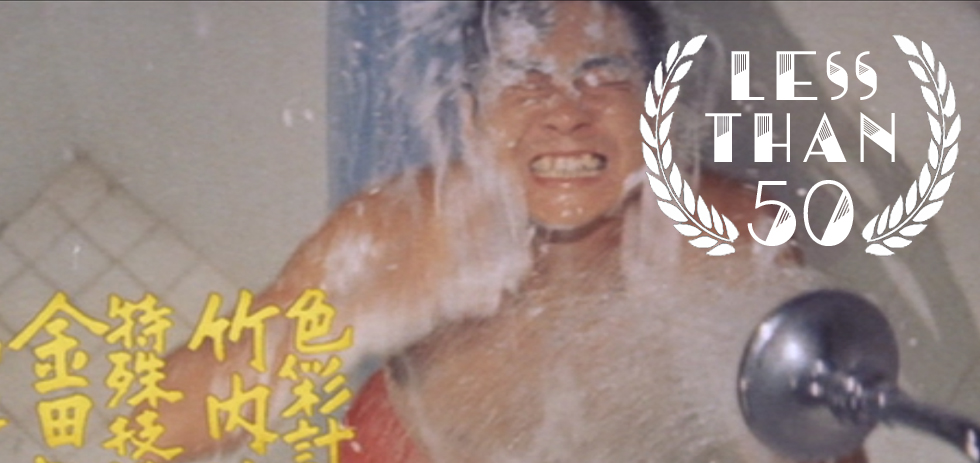In our new column, Less Than (Five) Zero, we take a look at films that have received less than 50 logged watches on Letterboxd, aiming to discover hidden gems in independent and world cinema. In this instalment, Jeremy Elphick looks at the Japanese New Wave off-cut I Hate But Love (1962).
Date Watched: 20th October, 2014
Letterboxd Views (at the time of viewing): 42
Koreyoshi Kurahara doesn’t share the legacy of many his contemporaries. He doesn’t have the broad support of the establishment, widely consumed by Kurosawa and Ozu, nor has he received the praise of Japanese New Wave filmmakers working around the same time, such as the lauded Nagisa Oshima and Shohei Imamura. However, Kurahura’s films were never geared towards the same audience; his films are unashamedly populist, endlessly tacky and often defined by their plot and character holes rather than let down by them.
While Kurahara has his opus Antarctica (which held the box office record n Japan for 14 years), the director is simultaneously responsible for a myriad of films that match this aforementioned formula for excess and triviality. His debut, I Am Waiting, was a fast-paced, by-the-books film noir that was wary to stray too far from the status quo of the genre. From there Kurahara’s films venture into the realm of Japanese New Wave, although his name is unlikely to emerge in shallow surveys of the movement. From The Warped Ones – a typical rebellion Sun Tribe tale – to Black Sun (an incredibly absurd flick about showdown between a Japanese man and a displaced African-American soldier all scored by Max Roach), Kurahara was making films that were bold, weird and underseen. With that said, I Hate But Love has a sense of expedience, confusion, flaws and oddities that define Kurahara’s style of filmmaking for a popular audience rather than an audience of critics. On one level, this leads to a film that starts as remarkably entertaining, on another, it quickly begins to exhibit its shortcomings as the film drags into a place of stunted action, a complete plot derailment and a shift in tone halfway through the film that genuinely feels like the director is beginning a second and almost unrelated piece.
Kurahara’s film is a flagrant exploration of Japanese pop culture in the 1960s. The quickly patched together, fairly cliche plot serves as a backdrop for a much larger presentation of cultural experiences and themes floating around throughout that time. I Hate But Love is a tacky film, though its cheapness only comes on an intellectual level, with the film as a whole being an unashamed blockbuster for its time. Kurahara places Yujiro Ishihara – the closest thing to a celebrity in the era – at the centre of the film as Daisaku. Ishihara’s presence in the earlier Kurahara film I Am Waiting, another noir film Rusty Knife and the game-changing rebellion film that promulgated Japan’s New Wave Crazed Fruit, positions him as more of a populist choice than his more critically acclaimed contemporaries. That is, he fits the broader scope of the film perfectly. Towards the start of the film he storms into his room, scrawling on the door, “WAKE ME UP AND I’LL BEAT YOU TO DEATH,” before an alarm clock on a plate is slid into his room, which he destroys, before being tricked into walking into a cold shower. The humour is often poor, but Ishara’s Daisaku is such a lauded public figure outside of the film that it’s not difficult to imagine these scenes killing it in cinemas at the time.

Ishara plays a talk show host (with much the same popularity as his presence in the real world) who is growing weary of his fame. There isn’t much more at the centre of Ishara’s story beyond this fairly cliche plot, however, his relationship with his manager, Noriko – a platonic relationship of several years – leads to most of the films best moments. Daisaku and Noriko’s agreement not to have sex, nor to kiss, becomes the centre of the film. Their attempt to move towards a more sexual relationship is portrayed by Kurahara as the comical centrepiece of the film as their tension continually draws to an anti-climax, embracing an often cliche audience tease. After about halfway through the film, things started to be less cogent, and markedly weirder. I Hate But Love quickly takes a literal detour about 40 minutes into film when Daisaku and Noriko’s relationship becomes peripheral as Daisuku, taking off to drive a jeep around Japan takes centre stage. Despite this, the rest of the film is never clear, often muddled and fairly confusing at times. That is, what starts as a quirky 1960s romantic comedy quickly devolves into a blurry road trip to nowhere. Noriko believes that their world is falling apart both professionally and romantically.
At times the film flirts with the pink film genre that was around in Japan at the time. Never nude, but often exposed, both charters are frequently portrayed in what was a fairly sexual light, often only in their underwear having tense encounters with sexual undertones that never really boil beyond that. In a few words, I Hate But Love is a film that is part of the collective shift in the way Japanese Film was made – inspired overtly by French New Wave, echoing Breathless most palpably – moving towards a more overt focus on sex in cinema, and using the idea of celebrity for the first time outside of the critical sphere. Kurahara’s style is distinctive. It’s something wholly his own, and while it doesn’t soar above, challenge or refine the existing sphere of cinema wherein he released I Hate But Love, there is a strong reflection of this broader idea of society permeating throughout. I Hate But Love isn’t a very good movie, when it comes down to it. It’s one of the weakest Kurahara films. That said, it’s something I’d recommend people to watch. Between its ability to serve as a window into a completely different way cinema was made, its presentation of celebrity and the audience the concept serves, and its context as one of the formative rather than definitive films of Kurahara’s career, I Hate But Love is a film that is worth watching, but far from an underseen classic.
